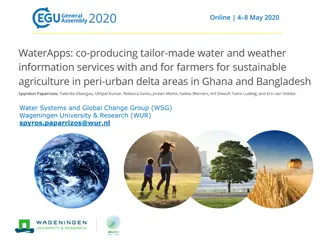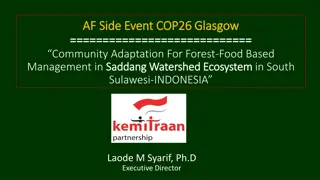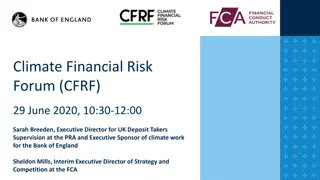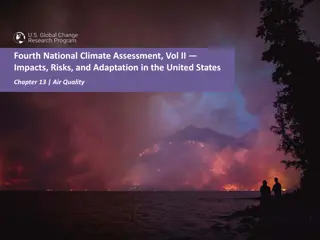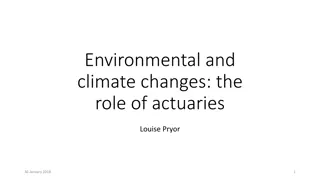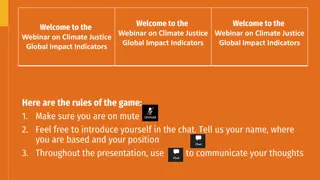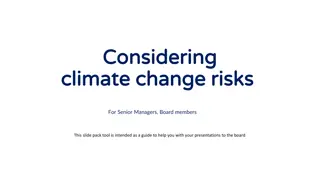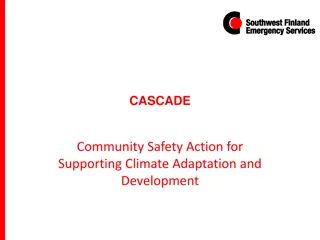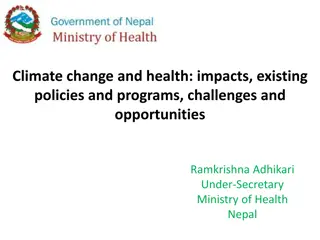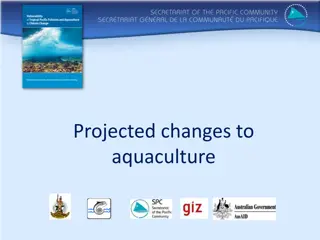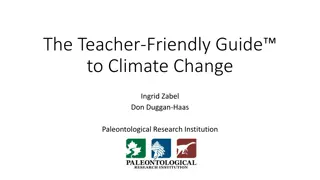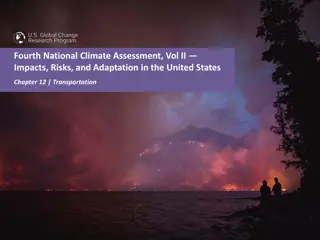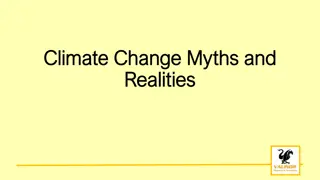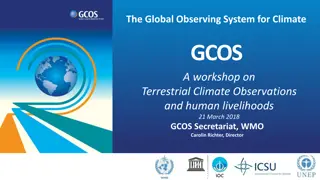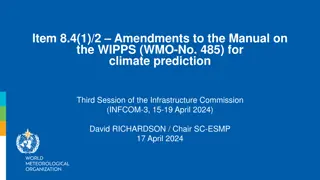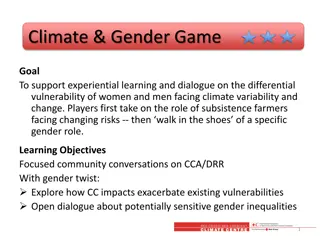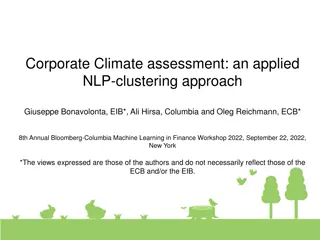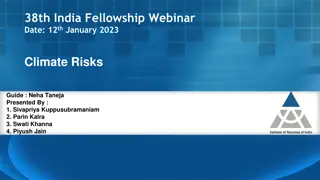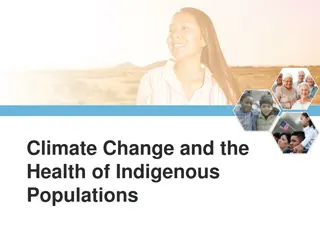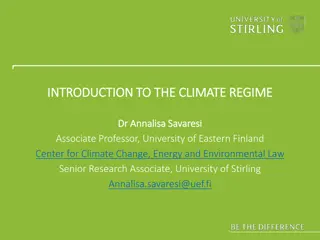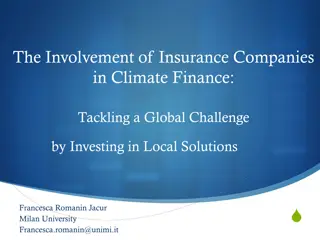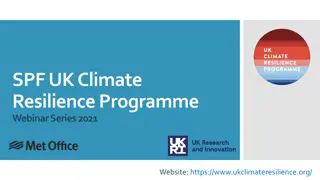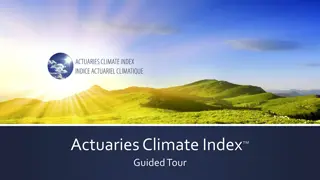Climate Change: Weather vs. Climate, Kppen-Geiger Classification, and Major Climate Zones
Explore the distinctions between weather and climate, delve into the Kppen-Geiger Climate Classification System, and discover major climate categories such as tropical climates. Gain insights into climate change and its impact on our environment.
9 views • 11 slides
National Climate Change Bill Overview
The National Climate Change Bill aims to establish an effective response to climate change in South Africa, promoting a transition to a low-carbon, climate-resilient economy. It focuses on coordinated actions, adaptive capacity enhancement, greenhouse gas management, and a fair global contribution.
10 views • 21 slides
Climate Justice & Disadvantaged Communities: Environmental Issues in US EPA Region 2
Climate justice and the impact on disadvantaged communities are key environmental issues addressed by Adriana Espinoza, Deputy Commissioner for Equity & Justice in US EPA Region 2. The initiative identifies and prioritizes disadvantaged communities based on multiple criteria, including environmental
5 views • 18 slides
Regional Climate Modeling in CORDEX South Asia for Climate Change Research
This information details the regional climate modeling efforts within the CORDEX South Asia framework, focusing on high-resolution dynamical downscaling of CMIP5 climate projections. It highlights the activities, opportunities, and challenges for assessing regional climate change, along with future
5 views • 11 slides
Climate Risk Stress Testing in Malaysia's Banking System by Dr. Lim Kok Tiong
Dr. Lim Kok Tiong presents a detailed case study on Climate Risk Stress Testing in Malaysia's banking system, assessing the financial impacts of physical and transition climate risks. The study highlights the implications on loan portfolios and expected credit losses, emphasizing the need for proact
1 views • 27 slides
Investment Responses to Biophysical Climate Impacts on Water, Energy, and Land in SDGs and Climate Policies
Investment assessments using Integrated Assessment Models (IAMs) are evolving to include biophysical climate impacts, assessing climate uncertainty on investments. The approach involves the MESSAGEix-GLOBIOM IAM, considering climate policy, SDG measures, and impacts under different scenarios. Climat
7 views • 32 slides
Gender-based Climate Change Litigation: A Key Solution?
Gender-based climate change litigation is emerging as a potential solution to address the disproportionate impact of climate change on different genders. Various international bodies have recognized the importance of integrating a gender-responsive approach in climate action to uphold human rights,
5 views • 12 slides
Enhancing Sustainable Agriculture Through Tailor-Made Water and Climate Services
Water Systems and Global Change Group at Wageningen University & Research conducted the WATERAPPS project aiming to provide customized water and climate information services for sustainable food production in peri-urban delta areas of Ghana and Bangladesh. The project focused on sharing platforms, v
1 views • 27 slides
Enhancing Community Resilience in South Sulawesi: A Sustainable Approach to Climate Adaptation
Empowering communities in the Saddang Watershed Ecosystem, South Sulawesi, Indonesia, to enhance their resilience against climate change. Projects focus on forest-food management, urban climate solutions, coastal community adaptation, and indigenous watershed governance. The initiative aims to stren
4 views • 8 slides
Climate Financial Risk Forum: Strategies for Assessing Climate-Related Financial Risks
Practical guide from the Climate Financial Risk Forum on using scenario analysis to assess climate-related financial risks, featuring insights from industry leaders and case studies to inform business decisions and risk management strategies.
0 views • 11 slides
Impacts of Climate Change on Air Quality and Health in the United States
The Fourth National Climate Assessment, Vol. II, highlights the increasing risks from air pollution in the United States, impacting over 100 million people in communities where air quality exceeds health-based standards. Climate change worsens air pollution levels, leading to adverse health effects,
0 views • 10 slides
The Role of Actuaries in Addressing Environmental and Climate Changes
Actuaries play a crucial role in assessing and managing risks posed by environmental and climate changes, aiding the insurance industry in mitigating these challenges. They consider long-term risks with significant financial implications, such as physical, transitional, and liability risks. Actuarie
0 views • 20 slides
Gender and Climate Change in Agriculture: Impacts and Adaptation Strategies
This workshop explores the intersection of gender and climate change in agriculture, emphasizing the importance of considering gender dynamics in adaptation planning. It covers the effects of climate change on men and women in agriculture, reasons for gender-sensitive adaptation planning, global and
1 views • 10 slides
Regional Project Proposal to Enhance Climate Resilience in Pakistan, Mongolia, and PRC
This proposal outlines a regional project focusing on enhancing climate resilience and agricultural productivity in Pakistan, Mongolia, and the People's Republic of China (PRC). The project aims to increase access to credit for smallholder farmers, promote climate-smart agriculture technologies, and
0 views • 12 slides
Personal Rights in European Climate Litigation
Climate litigation in Europe focuses on individual rights and the shortcomings of traditional governance mechanisms in addressing climate change. The emergence of climate litigation as a crucial tool in governance is driven by the need to protect individuals and specific groups who are disproportion
1 views • 17 slides
Analyzing Systemic Climate Risk in the Financial Sector
This study discusses systemic climate risk in the financial sector by examining the effects of climate risks on financial institutions. It aims to design a market-based framework to assess the vulnerability of financial institutions to climate risks and analyze potential contagion effects. The frame
2 views • 39 slides
Climate Justice Global Impact Indicators Webinar - June 2023
Explore the Climate Justice Theory of Change, key definitions, impact indicators, and the importance of climate-relevant decision-making in this informative webinar. Gain insights on climate adaptation, resilience, and the effects of climate change, all aimed at empowering marginalized communities t
1 views • 27 slides
Managing Financial Risks in a Changing Climate Environment
Assessing climate-related and environmental risks is vital for ensuring the safety and soundness of financial institutions. These risks include physical risk drivers like extreme weather events and transition risk drivers related to policy measures and technological changes. The complexity and uncer
0 views • 11 slides
Addressing Climate Change Risks: Guidance for Senior Managers and Board Members
This slide pack tool provides guidance on addressing climate change risks for senior managers and board members. It covers key messages such as understanding obligations and gaps, identifying climate change risks, exploring responsibilities, and implementing actions to address these risks effectivel
1 views • 11 slides
CASCADE Project: Climate Adaptation & Development Support
CASCADE is a two-year project funded by DG ECHO aimed at developing a macro-regional approach for climate change risks in the Baltic Sea Region. The project focuses on risk assessment, treatment, and capacity building to enhance urban risk management related to climate change. It involves civil prot
0 views • 8 slides
Climate Change and Health Impacts in Nepal: Challenges and Opportunities
This document explores the impacts of climate change on health in Nepal, highlighting existing policies, programs, challenges, and opportunities. Nepal is among the most vulnerable countries due to its heavy reliance on climate-sensitive sectors, fragile ecosystems, and technical capacity constraint
1 views • 21 slides
National Priorities for Climate Change Science and Knowledge in Canada
Canadians are experiencing firsthand the impacts of climate change, including wildfires, heatwaves, floods, hurricanes, and droughts. To address these challenges, foundational climate change science and knowledge are essential for understanding our changing environment, identifying impacts, making i
2 views • 9 slides
Aquaculture Adapting to Climate Change: Insights and Strategies
Aquaculture faces evolving challenges due to climate change. Freshwater and coastal aquaculture, focusing on tilapia, milkfish, freshwater prawn, and marine species, are explored. The vulnerability of aquaculture is highlighted, along with potential benefits and risks posed by climate change. Strate
0 views • 25 slides
Climate and Its Impact on Earth
Exploring the fundamentals of climate, this comprehensive guide covers topics such as climate zones, climate formation, atmospheric composition, the role of CO2, ocean heat absorption, and circulation patterns. From the basics of weather and seasons to the significant impact of climate change, learn
0 views • 12 slides
The Teacher-Friendly Guide to Climate Change
The Teacher-Friendly Guide to Climate Change authored by Ingrid Zabel, Don Duggan-Haas, Robert Ross, and others explores topics such as climate measurement, natural causes of climate change, historical climate perspectives, and more. It delves into the significance of understanding past climates to
2 views • 12 slides
Climate Change Impacts on U.S. Transportation Infrastructure
The Fourth National Climate Assessment reveals the risks climate change poses to the U.S. transportation system. Heavy precipitation, coastal flooding, heat, and wildfires threaten the reliability, safety, and efficiency of transportation infrastructure, leading to societal and economic consequences
0 views • 11 slides
Climate Change Myths and Realities: Debunking Common Misconceptions
This content discusses common myths surrounding climate change and provides evidence-backed realities to debunk them. Topics include the pause in warming, natural climate variability, misconceptions about climate models, the impact of CO2 on plant life, and the consensus among climate scientists. Th
3 views • 6 slides
The Global Observing System for Climate and Terrestrial Climate Observations
The Global Observing System for Climate (GCOS) plays a crucial role in observing climate-related variables globally. Established in April 1992, GCOS focuses on what, how, and where to measure, sustain measurement, manage change, data transmission, management, rescue, and access. It addresses concern
0 views • 17 slides
Amendments to WIPPS Manual for Climate Prediction at INFCOM-3, April 2024
The document discusses amendments to the Manual on WIPPS for climate prediction, including new recommendations for weather, climate, water, and environmental prediction activities. It introduces concepts such as Global Climate Reanalysis and the coordination of multi-model ensembles for sub-seasonal
1 views • 10 slides
Climate Change Litigation in Aotearoa/New Zealand: LCANZI Action and Judicial Review
The Lawyers for Climate Action NZ Incorporated (LCANZI) are actively involved in climate change litigation in Aotearoa/New Zealand, including challenging government decisions related to climate responses. A notable case involved a judicial review against Auckland Transport, where the High Court refu
2 views • 6 slides
Climate & Gender Game: Experiential Learning on Vulnerability
Engage in the Climate & Gender Game to understand the impacts of climate change on gender roles. Step into the shoes of subsistence farmers facing changing risks and explore the differential vulnerabilities of women and men. Initiate community conversations on Climate Change Adaptation and Disaster
0 views • 10 slides
Corporate Climate Assessment Using NLP Clustering
This work explores a novel approach in corporate climate assessment through applied NLP clustering, highlighting the relationship between climate risk and financial implications. The use of advanced techniques like BERT embedding for topic representation and clustering in corporate reports is discus
0 views • 33 slides
Climate Risks in India: Insights from the 38th India Fellowship Webinar
Explore the impacts of climate risks in India through the lens of physical and transition risks detailed during the 38th India Fellowship Webinar on January 12, 2023. Key topics include climate change interactions, liability risks, and risk management strategies for a sustainable future.
0 views • 37 slides
Weather and Climate Factors
Weather and climate are essential aspects of understanding the Earth's atmosphere. Weather refers to short-term atmospheric conditions, while climate represents long-term averages over 30 years. Factors influencing climate include distance from the equator, altitude, proximity to the sea, wind direc
0 views • 10 slides
Impact of Climate Change on Indigenous Health in the United States
Climate change poses significant risks to the health of Indigenous populations in the United States. The US Climate Health Assessment highlights these risks and emphasizes the vulnerability of tribal communities. Factors such as food insecurity, water scarcity, and air quality issues exacerbate exis
0 views • 9 slides
The International Climate Regime and Governance
In this comprehensive overview, Dr. Annalisa Savaresi delves into the intricacies of the international climate regime, highlighting key aspects such as international climate law, major climate conferences like COP26, and the evolution of climate governance. The discussion covers important agreements
1 views • 27 slides
The Role of Insurance Companies in Climate Finance: Addressing Global Challenges through Local Investments
Exploring the engagement of insurance companies in climate finance, this presentation highlights the significance of private sector involvement in tackling climate change at a local level. It delves into key concepts such as mitigation, adaptation, and the global scientific targets for combating cli
0 views • 11 slides
UK Climate Resilience Programme Webinar Series 2021
The UK Climate Resilience Programme is hosting a webinar series featuring experts discussing climate resilience, adaptation strategies, and socio-economic pathways for the UK. Attendees can engage in presentations, Q&A sessions, and access recorded content post-event. Learn about the latest developm
0 views • 10 slides
The Actuaries Climate Index: A Comprehensive Guide
The Actuaries Climate Index (ACI) is an essential tool that measures climate risks using historical data collected since 1961. It focuses on extreme climate events and sea level changes, providing valuable insights into the impacts of climate change. By analyzing the ACI and its components, users ca
1 views • 18 slides
Canadian Climate Change Policy from a Climate Ethics Perspective
Explore the ethical implications of Canadian climate change policy, delving into the necessity of meeting targets established in the Paris Agreement, the need for rapid decarbonization, and the availability of climate-safe energy alternatives. The presentation emphasizes the urgency of action to mit
0 views • 16 slides







